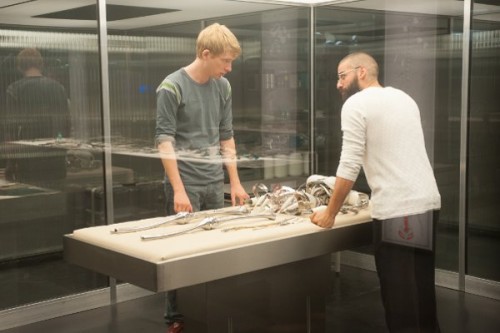"IT'S NOT JUST the history of Man; it’s the history of gods,” proclaims an excited Domhnall Gleeson in Alex Garland’s Ex Machina, a fantasy parable about the march of modern technology.
Ex Machina is Garland’s directorial debut.
The cult novelist and screenwriter previously produced The Beach (2000), 28 Days Later (2002) and Sunshine (2007), all with Danny Boyle.
His narrative themes involve aspects of moral ambiguity and precarious human interaction with machinery and Ex Machina extends his psycho-sci-fi interests.
Multi-layered and unsettling, it’s far too soon to discuss the films of the year but this gets 2015 going in great style.
Unusually for the sci-fi genre, the story is set in our current day.
Gleeson, who will also appear in the new Star Wars film later this year, plays Caleb, a geeky computer coder at the powerful Bluebook organisation, owned by the charismatic but crazy Nathan (Oscar Isaac).
When Caleb wins an in-house competition to visit Nathan at his remote private estate (the size of a small country), he unexpectedly gets entangled in a battle of wills with tendrils leading in many directions.
Something of a Howard Hughes-type recluse and an imaginative genius, Nathan expects Caleb to assist his experiment in creating a robot with artificial intelligence.
What focuses the interest of Nathan and Caleb is the mysterious Ava (Alicia Vikander), a ‘being’ made entirely of processed or synthetic materials but exhibiting a delicate grace and beauty.
When Caleb first encounters Ava she is an ethereal presence, consisting merely of a lovely face and a sketchy outline. Yet while there seems to be little to her, Ava is, as they say, all there.
A bright and sharp-witted interlocutor, Ava’s meetings with Caleb lead him to find her responses penetrating, challenging and perplexing.
Tasked by Nathan with applying the enigmatic Turing test (named after code breaker Alan Turing), Caleb must assess if Ava has become a machine that thinks independently. But for several reasons he finds himself in a quandary.
Random power shutdowns leave him trapped in his room. Nathan says there’s a flaw in the wiring, but is there a more sinister reason?
During one shutdown Ava warns Caleb not to trust Nathan, but has Nathan himself coded his robot to give this warning? Through CCTV Nathan monitors Caleb’s interviews with Ava, but what else does he watch?
Caleb feels knocked off balance but can’t tell how he’s being wrong-footed. There’s a nebulous sense of unease. Nathan’s ultra-modernist mansion is all clean, smooth surfaces, except for one small spider-web crack in a pane of glass. How did that get there?
When Ava and Caleb begin to talk less like subject and observer and more like man and woman, his fascination becomes less technical and more carnal. But has Nathan orchestrated this development or is it spontaneous? “Did you programme her to flirt with me?” he asks. “Why did you give her sexuality?”
Eventually it’s not clear who is studying whom.
Now, storytellers have long been producing narratives to symbolise how technology is both a blessing and a curse.
The machines we invent can slip beyond our control; Mary Shelley’s Frankenstein proves that truism.
Sociologists know that we’re often devoted to the devices that should be serving us — our motor cars, laptops, mobile phones. Being captivated by them makes us their captives.
So, Ex Machina draws from the same well of surreal techno-takeover nightmares as Michael Crichton’s Westworld (1973) and Ridley Scott’s Blade Runner (1982), and Garland sits alongside Phillip K. Dick and JG Ballard.
But Garland’s movie also cleverly implies that it’s Man and not machine that’s the most destructive force.
Psychologist BF Skinner remarked that we shouldn’t worry if machines think artificially, but if they think like us. It’s like HAL, the computer in Kubrick’s 2001: A Space Odyssey (1968), using native cunning against its human masters.
Artificial intelligence is fine, but we’re banjaxed if robots ever form the natural nefarious instincts of humans.
Along with issues of humanity and modernity Ex Machina reflects upon human behaviour from time immemorial. Relations between men and women sit at the core of Garland’s narrative.
Whether consciously or not, Nathan and Caleb endeavour to create their perfect female and the movie stirs controversies regarding what Laura Mulvey terms “the male gaze”.
The ancient myth of Pygmalion comes to mind, the sculptor who falls in love with his female statue. There are also parallels with Japanese director Takashi Miike’s slick but sanguinary horror Audition (1999), in which two men mould a beautiful girl into an ideal of womanhood.
When Ava thinks less by artificial intelligence but more by female intuition, there’s a power shift that flummoxes the guys in the process. “I’ll know if you’re lying,” she tells Caleb, words to chill the spine of any man.
Feminists will debate the uncertainties of the story turning Ava the robot into Ava the empowered woman. But by evolving deviousness and deception, it/she certainly starts thinking like a human.
Ex Machina reveals its moral ideas subtly, rather than carrying them heavily. The lush Norwegian tundra is visually stunning as a backdrop location (an alternative Eden) and the actors are completely convincing.
Compulsive, unmissable stuff.
Ex Machina in cinemas now


